Baraka: Ballot Reform 'Long Overdue'

Newark's reputation statewide is not a good one. That's just reality.
Ras Baraka knows that. And given the fact Baraka is not just the city's mayor, but also a 2025 gubernatorial candidate, the reputation of the state's largest city is quite relevant.
It was also one of the first questions posed to the mayor Tuesday afternoon when he took part in a "gubernatorial conversation" at Fairleigh Dickinson University in Madison. The university is inviting all announced - and potential - candidates to campus to discuss issues. This week was Baraka's turn.
The host was Peter Woolley, a long-time political science professor at the school, and he quickly brought up how the city is perceived.
He began with good news. The crime rate in Newark is much lower than many similar-sized cities around the country.
This is brought out by FBI stats and various other studies. Woolley, in fact, noted that he just spent a weekend in Nashville, Tenn, which he said has a much higher violent crime rate than Newark.
Some national studies on crime can't be compared. because they employ different metrics, but in all studies Newark's violent crime rate does not make the top 20 of dangerous cities across the nation.
Still, the negative perception of Newark persists - a lingering memory, perhaps, dating back to the riots of 1967.
When Woolley asked the mayor for his take, Baraka said, "You got to ask your journalist friends about that."
That was not a real answer, but in a conversation afterwards, I asked the mayor about race.
Baraka acknowledged that some in suburbia see a mostly black city and think the worst regarding crime.
He said that is a continuing challenge, but he also noted that this is more of an older generation thing. That would be those old enough to remember the riots, or at least, their immediate aftermath.
The state's younger generation, Baraka said, does not necessarily think that way.
As a candidate for governor, Baraka wants to represent Newark, other cities, but also the "leafy suburbs," which is how they were described.
"The issues that we deal with in Newark are statewide issues," he said, ticking off housing, education and affordability.
While people may look at Newark as some type of anomaly, Baraka contended:
"All the problems the state has are pronounced in the city of Newark."
So, he inferred, who better to deal with them?
The race for governor is still more than a year away.
So, obviously, the mayor was asked about the current Democratic battle between Andy Kim and Tammy Murphy.
This involves not only the one-on-one race, but a pending federal suit challenging the "county line," a primary ballot system that favors candidates backed by party leaders.
Baraka was asked if he had a "horse" in the Senate fight. He does not.
But he also said reform in how ballots are designed in New Jersey is overdue.
Baraka called the current system "just a hodgepodge, a mess."
Pointing out that it makes no difference who is running, Baraka said the traditional way of doing things in New Jersey is "common sense, un-democratic."






Watch out his pops was a radical socialist years ago. Did the apple fall far from the tree?
Newark is ranked as the 2nd most dangerous city in New Jersey after Camden, and just ahead of Paterson, Trenton and Elizabeth. New Jersey’s largest city has the second highest crime rate; while also being a hub for commerce and industry in the state, it also has a violent crime rate of 7.7 per 1,000 people and a property crime rate of 6,620 per 100,000 people. Even though the Newark Mayor sent his findings to the FBI as for Newark doing better, that is a subjective report and analysis in order to look good. It's not a real statistic that can be measured by any relevant metric. Newark is still ranked within the Top 100 most dangerous cities in the U.S.